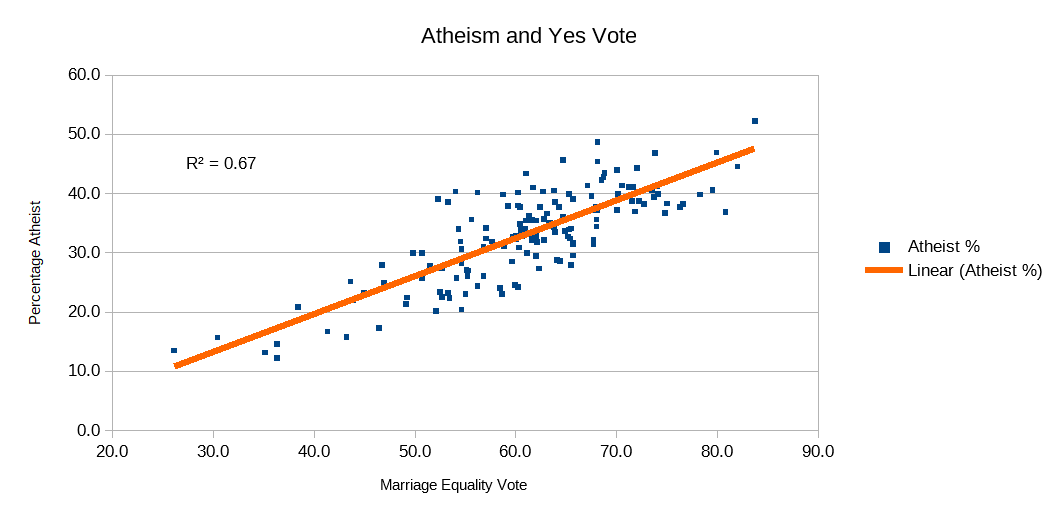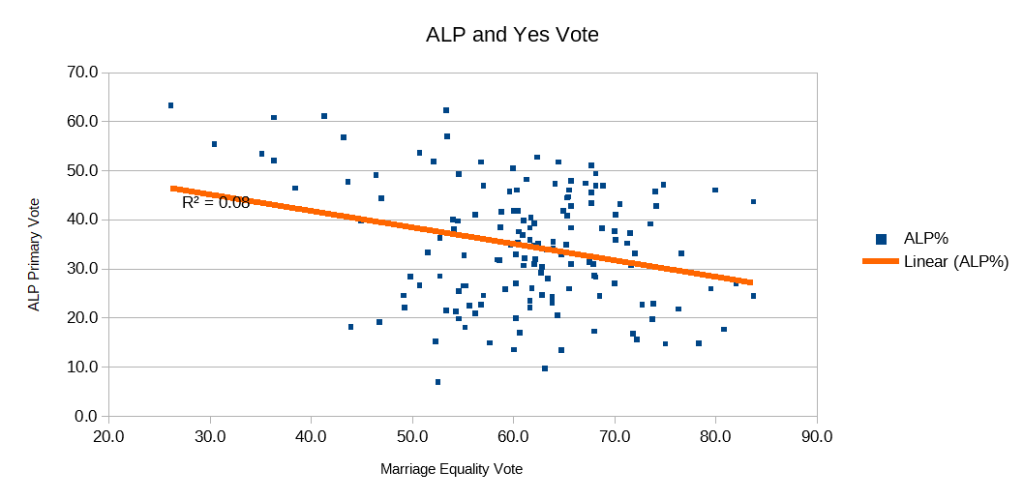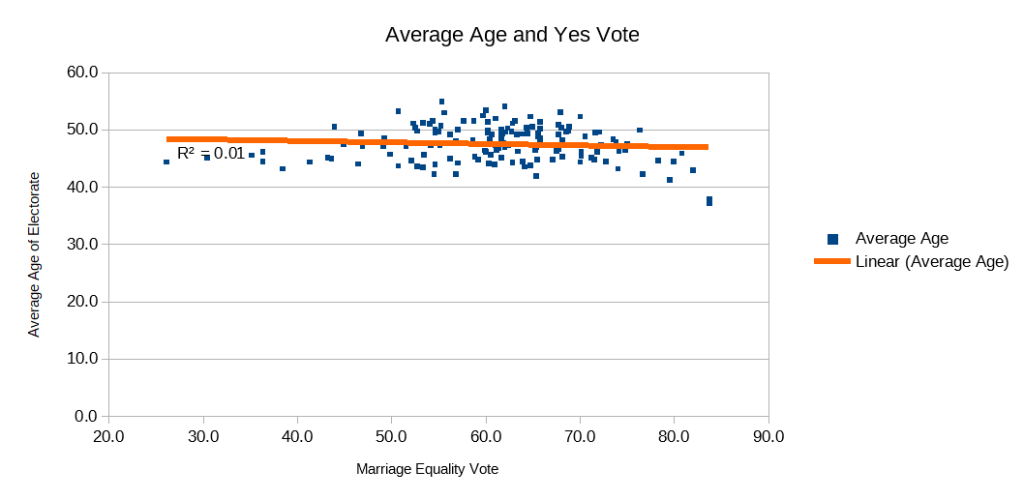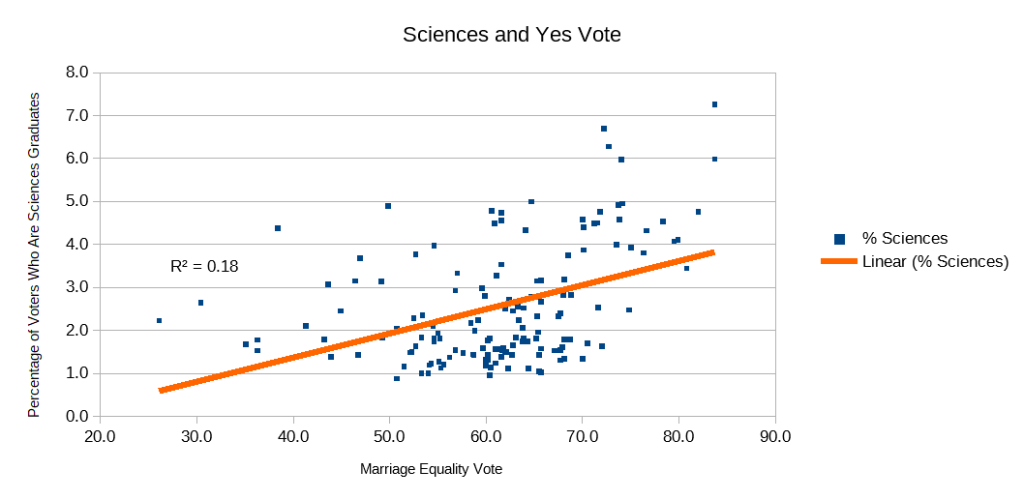The ABS released the results of Australia’s survey into the legalisation of gay marriage today. The headline result was a win for the ‘Yes’ vote, with 61.6% of the vote which should translate into legislation in the near future. Thanks to the release of data per electorate, we can also use this to take a look at what sorts of communities were more supportive of the change. As a pure issue of social liberalism versus conservatism, this gives us the opportunity to consider positions of groups of people solely on an axis of social issues, rather than conflating them with economic issues as is the case in general elections. As the data is only detailed down to a per electorate basis however, we do need to consider that across an electrorate there may be substantial variation as well as a cacophony of variables acting in multiple ways, so these are certainly guides rather than anything genuinely scientific.
Let’s start with the obvious: did support for a political party at the last election translate into support or opposition to marriage equality?
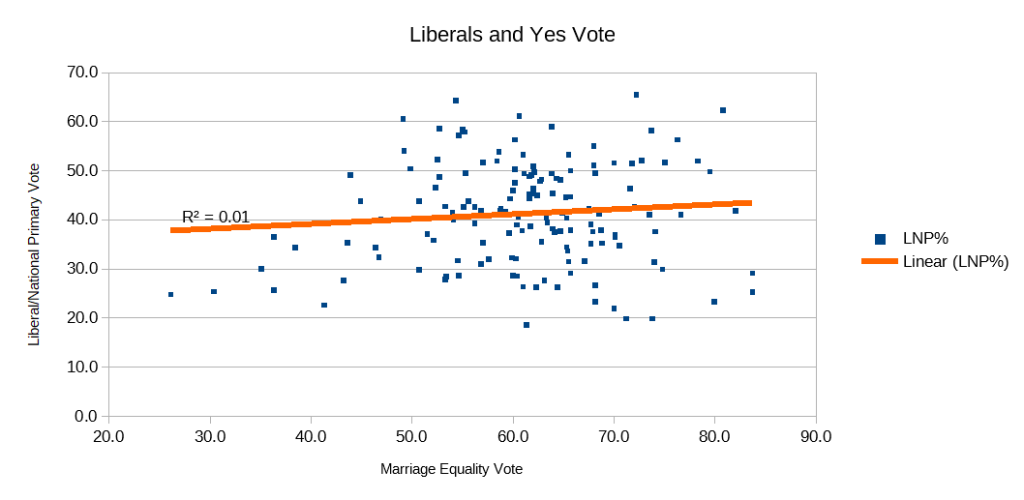 Support for the Liberal and/or National parties had virtually zero correlation with support for marriage equality. This is a little surprising, since Tony Abbott, avatar for the party’s right wing base has staunchly opposed the change. Perhaps there is no ‘silent majority‘ of conservatives?
Support for the Liberal and/or National parties had virtually zero correlation with support for marriage equality. This is a little surprising, since Tony Abbott, avatar for the party’s right wing base has staunchly opposed the change. Perhaps there is no ‘silent majority‘ of conservatives?
The ALP provides another somewhat surprising result with a trend against marriage equality, albeit a very weak one. The Labor Party has supported the move in parliament and Bill Shorten campaigned for the Yes vote in this plebiscite.
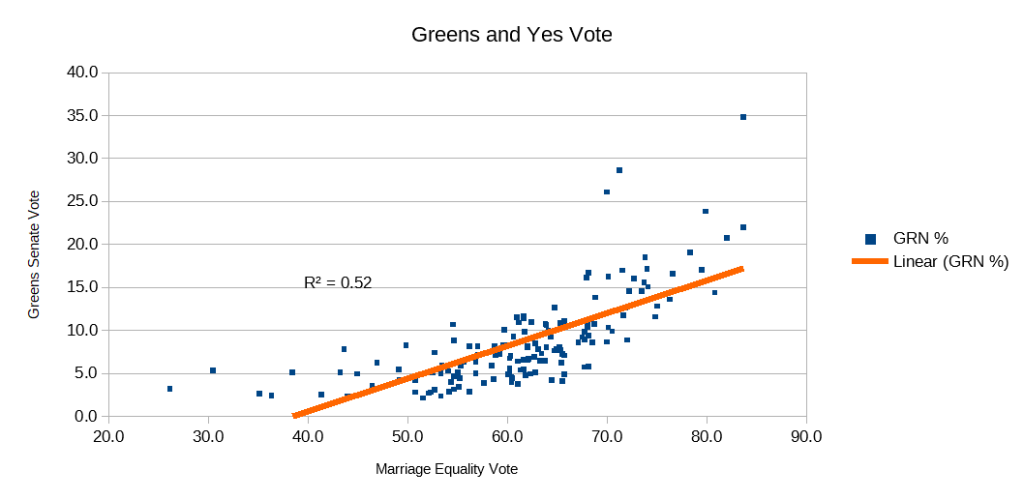 Supporters of the Greens also supported marriage equality, with quite a strong correlation considering the limited data we have to draw from. As the Greens ignore economic issues, social issues like this have come to define the party under Richard Di Natale’s leadership, so this doesn’t come as a surprise.
Supporters of the Greens also supported marriage equality, with quite a strong correlation considering the limited data we have to draw from. As the Greens ignore economic issues, social issues like this have come to define the party under Richard Di Natale’s leadership, so this doesn’t come as a surprise.
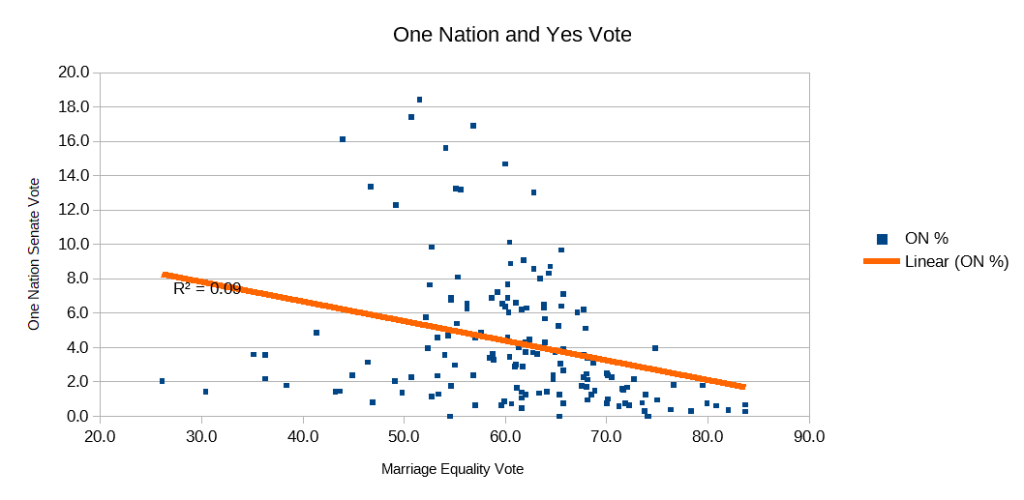 As they gear up for what appears to be a strong performance in the Queensland election, One Nation have come to represent Australia’s branch of reactionism. One would have expected that their supporters would be strongly against gay marriage, which their more strident supporters would denounce as ‘degenerate‘, yet their voters result is little different from the Labor Party. It is possible that their Queensland parochialism at the last election is distorting these results, with many of the electorate which recorded majorities for No being located in NSW.
As they gear up for what appears to be a strong performance in the Queensland election, One Nation have come to represent Australia’s branch of reactionism. One would have expected that their supporters would be strongly against gay marriage, which their more strident supporters would denounce as ‘degenerate‘, yet their voters result is little different from the Labor Party. It is possible that their Queensland parochialism at the last election is distorting these results, with many of the electorate which recorded majorities for No being located in NSW.
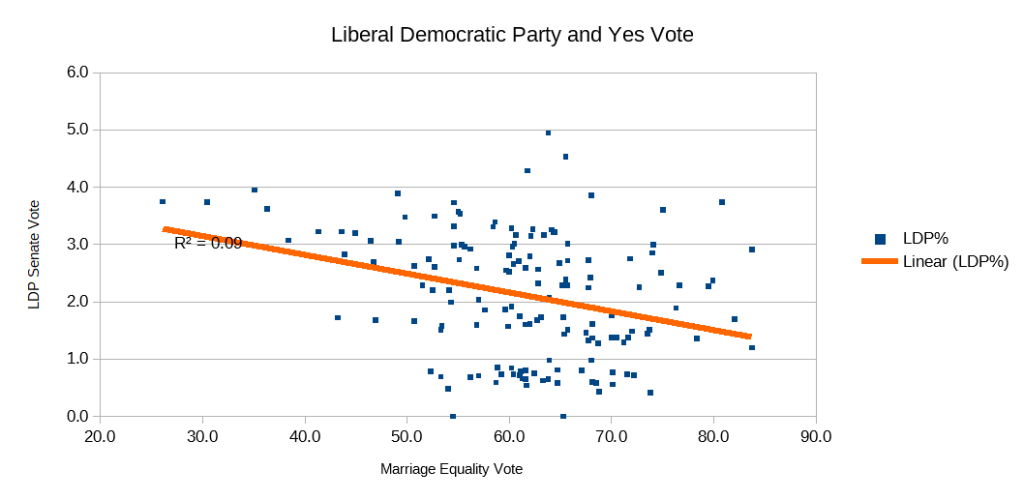 The Liberal Democratic Party is a minor one, represented only by David Leyonhjelm in the Senate. But as the sole representatives of the right-libertarian tradition in Australia, they are an interesting case study, supporting both free markets and civil liberties. However, their voters don’t appear very concerned about individual liberties, with a similar very weak opposition to marriage equality to that of One Nation and the Labor Party.
The Liberal Democratic Party is a minor one, represented only by David Leyonhjelm in the Senate. But as the sole representatives of the right-libertarian tradition in Australia, they are an interesting case study, supporting both free markets and civil liberties. However, their voters don’t appear very concerned about individual liberties, with a similar very weak opposition to marriage equality to that of One Nation and the Labor Party.
Religion is another area which would be expected to have a strong influence on voter intentions in this poll. One of the main arguments against the legalisation of gay marriage has been the protection of religious rights, so one would expect many of those with strong religious beliefs to vote No. However, cultural Christianity where folks tick the box on the census without practicing the religion is a bit of an obstacle here, we can’t tell which Christians are devout and who haven’t set foot in a church for years.
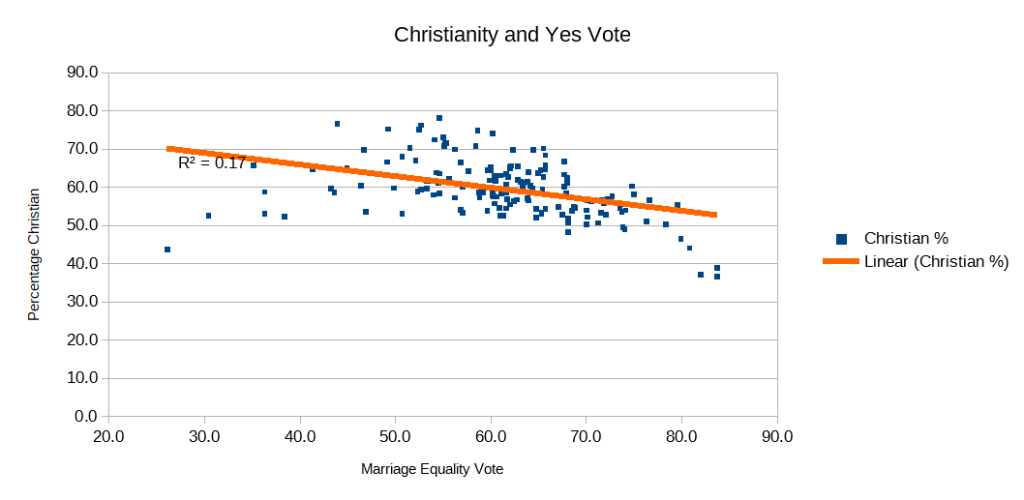 Electorates with a higher proportion of Christians generally record lower support for marriage equality. The correlation isn’t as strong nor the slope as steep as might be expected, but the millions of non-practicing folks as well as well as the variance between both faiths and individual parishes under the broad envelope in relation to this issue are likely reasons for this.
Electorates with a higher proportion of Christians generally record lower support for marriage equality. The correlation isn’t as strong nor the slope as steep as might be expected, but the millions of non-practicing folks as well as well as the variance between both faiths and individual parishes under the broad envelope in relation to this issue are likely reasons for this.
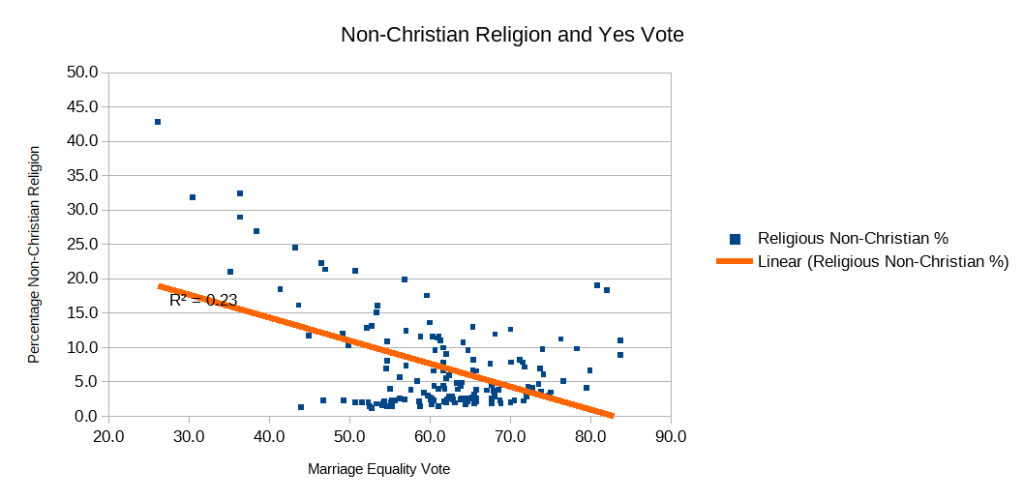 I’ve lumped all the non-Christian religions in together, which is certainly blasphemous. But with the relatively low proportions of the population following each of these creeds, looking at them each individually would mean single data points exert oversized influences. It turns out that Islam, Buddhism and Hinduism all have similar plots anyway, though Judaism is strong in Melbourne Ports, Wentworth and Goldstein which all recorded strong Yes votes, but has only small numbers nationwide. The number of believers in a non-Christian religion translated into opposition to marriage equality in a consequential manner.
I’ve lumped all the non-Christian religions in together, which is certainly blasphemous. But with the relatively low proportions of the population following each of these creeds, looking at them each individually would mean single data points exert oversized influences. It turns out that Islam, Buddhism and Hinduism all have similar plots anyway, though Judaism is strong in Melbourne Ports, Wentworth and Goldstein which all recorded strong Yes votes, but has only small numbers nationwide. The number of believers in a non-Christian religion translated into opposition to marriage equality in a consequential manner.
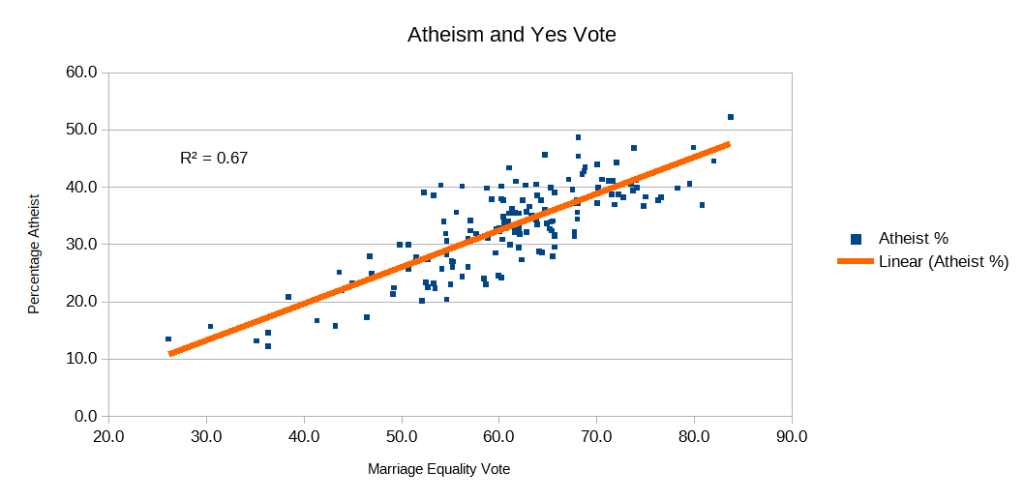 Support for Atheism (or otherwise ticking the ‘no religion’ box on the census) was the strongest predictor of support for marriage equality. Without religious arguments the case for No fell flat, relying only on political correctness dogwhistles which would have little effectiveness outside the cesspits of Youtube.
Support for Atheism (or otherwise ticking the ‘no religion’ box on the census) was the strongest predictor of support for marriage equality. Without religious arguments the case for No fell flat, relying only on political correctness dogwhistles which would have little effectiveness outside the cesspits of Youtube.
The opposition to marriage equality among those of non-Christian religions is interesting and may come from within or without the religion in the form of cultural factors. So let’s look at some other cultural and demographic factors and see what impact they may have had.
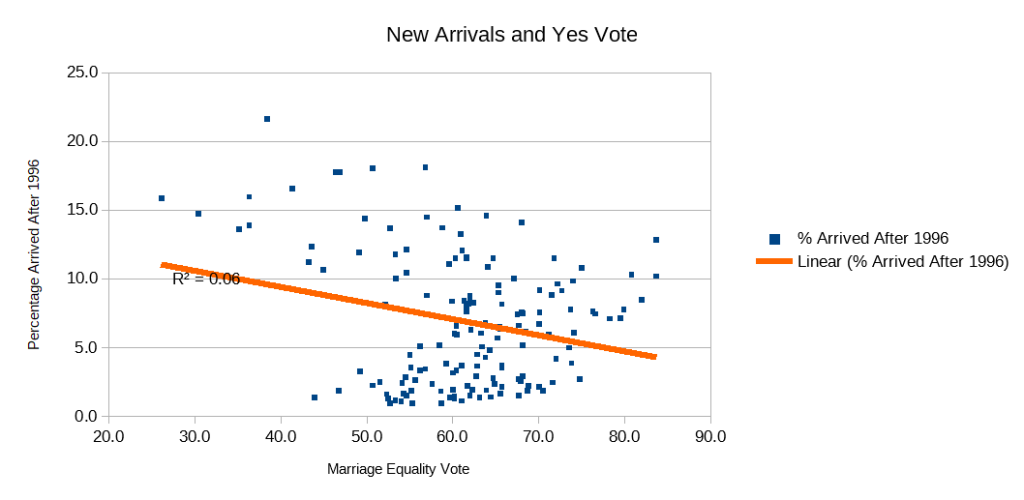 Are these religious folks who oppose gay marriage retaining aspects of a more conservative culture as recent immigrants? It would appear not, or at least not with enough strength to justify the non-Christian religion relationship with very minimal correlation between the proportion of new arrivals and the likelihood of voting No.
Are these religious folks who oppose gay marriage retaining aspects of a more conservative culture as recent immigrants? It would appear not, or at least not with enough strength to justify the non-Christian religion relationship with very minimal correlation between the proportion of new arrivals and the likelihood of voting No.
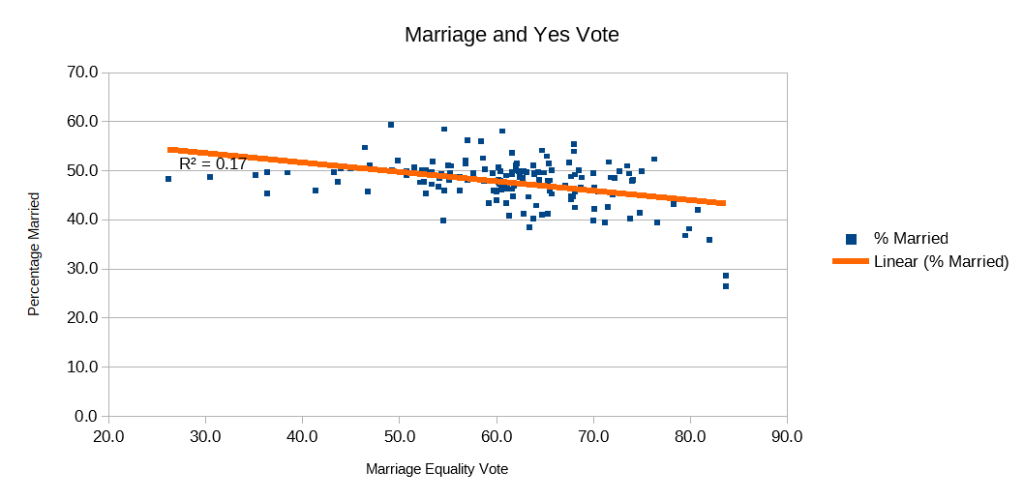 What impact does living in an existing marriage have on support for gay marriage? There does appear to be some weak effects which may also link to the opposition among religious folks, who themselves are more likely to be married.
What impact does living in an existing marriage have on support for gay marriage? There does appear to be some weak effects which may also link to the opposition among religious folks, who themselves are more likely to be married.
It would also be expected that older folks would more likely to vote No (and indeed was the strategy behind the postal survey), which would also explain the correlation with marriage. But from the data, there was no correlation between average age of the electorate and likelihood of either vote. This is a case where the more granular data which the ABS no doubt has themselves would be very handy in order to push this point further, because electorates with universities will have younger ages but also more naturalised students from overseas who would be more religious, so the expected trend here may be cancelled out by two conflicting tendencies.
Since we’re already drawing long bows with electorate-wide datasets, I’d like to entertain one of my pet topics – area of tertiary study. Having a university degree is correlated with support for marriage equality, but there are some differences between areas which might be quite interesting.
The sciences (including physical and environmental sciences as well as mathematics) make for a good baseline. There is increased support for marriage equality as the proportion of graduates in the field increases, but an R2 of 0.18 indivcates that the relationship is loose, rather than the stronger results we saw for Greens support or Atheism.
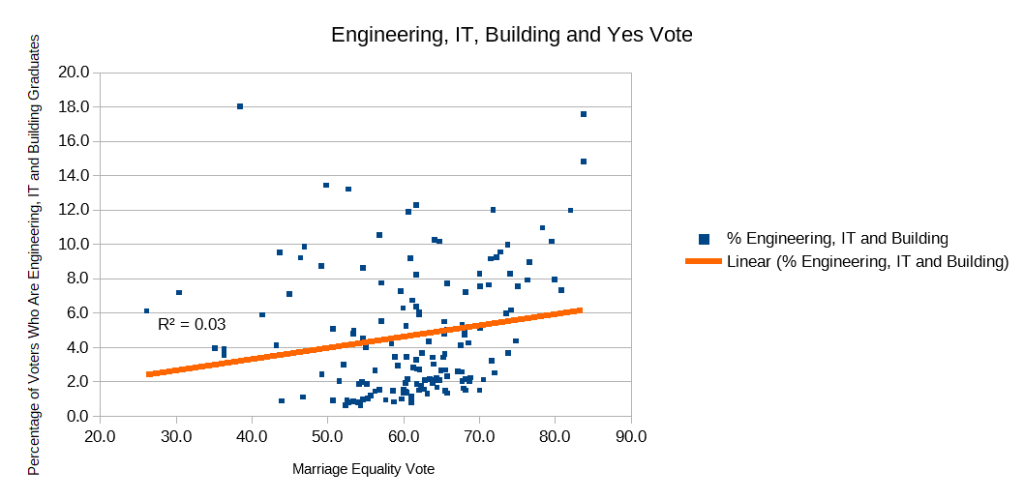 What you might call the applied sciences – engineering, IT, building and architecture show virtually no correlation with support for a Yes vote. The trend line is positive, but with an R2 of 0.03 it might as well be a squiggle for all the meaning it conveys. Personally I put this down to the lack of critical thinking imparted by these subjects in comparison to other areas of study, but there could be plenty of other explanations as well.
What you might call the applied sciences – engineering, IT, building and architecture show virtually no correlation with support for a Yes vote. The trend line is positive, but with an R2 of 0.03 it might as well be a squiggle for all the meaning it conveys. Personally I put this down to the lack of critical thinking imparted by these subjects in comparison to other areas of study, but there could be plenty of other explanations as well.
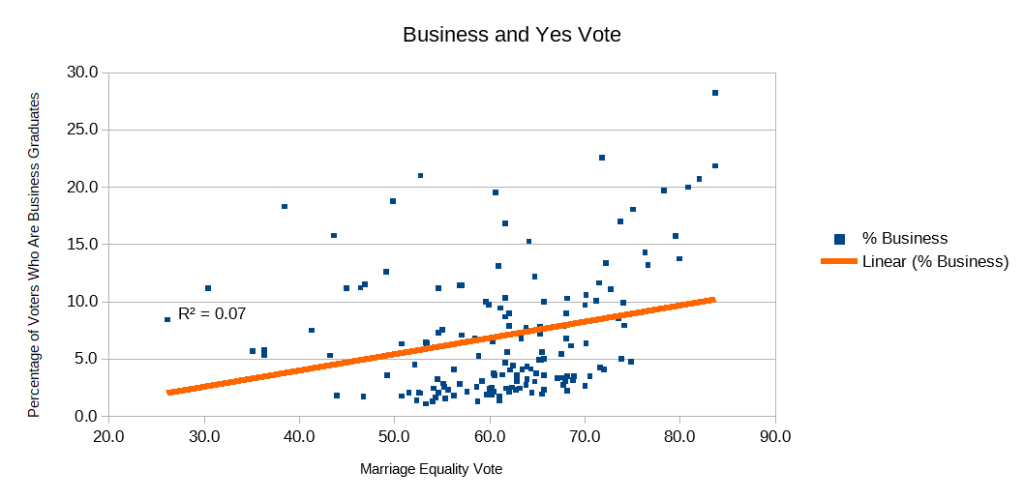 Management and commercial studies (which I’ve grouped under Business) have a very weak correlation to support for gay marriage, but it is stronger than that from the applied sciences.
Management and commercial studies (which I’ve grouped under Business) have a very weak correlation to support for gay marriage, but it is stronger than that from the applied sciences.
 Those with qualifications in the heath area are likely to have witnessed firsthand the effects of discrimination upon LGBTIQ+ members of the community in their work. The significant correlation between increased numbers of these folks and support for marriage equality in an electorate is logical considering this.
Those with qualifications in the heath area are likely to have witnessed firsthand the effects of discrimination upon LGBTIQ+ members of the community in their work. The significant correlation between increased numbers of these folks and support for marriage equality in an electorate is logical considering this.
 Similarly, those with education qualifications will have worked with gay kids and seen that they are no different from straight kids. This contact at a time when children are vulnerable and insecure if struggling with their sexuality will have helped to push their teachers towards the increased support for marriage equality which can be seen here.
Similarly, those with education qualifications will have worked with gay kids and seen that they are no different from straight kids. This contact at a time when children are vulnerable and insecure if struggling with their sexuality will have helped to push their teachers towards the increased support for marriage equality which can be seen here.
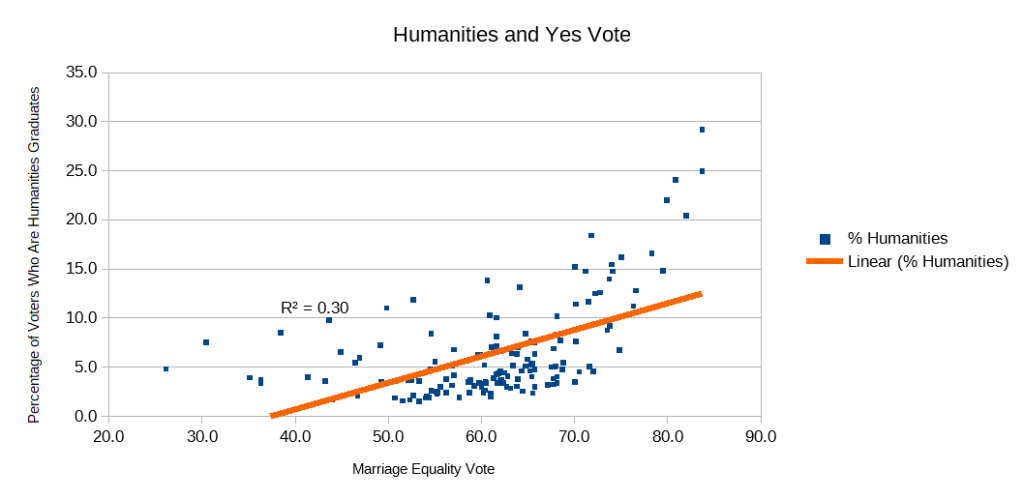 Cultural Marxism! The humanities (arts and social sciences) have the strongest correlation between proportions of graduates within the electorate and that electorate’s vote in the gay marriage survey. Either the Frankfurt School funded by George Soros is corrupting our youth, or the lessons in critical thinking, philosophy and history which come with the field tend to support liberal social values.
Cultural Marxism! The humanities (arts and social sciences) have the strongest correlation between proportions of graduates within the electorate and that electorate’s vote in the gay marriage survey. Either the Frankfurt School funded by George Soros is corrupting our youth, or the lessons in critical thinking, philosophy and history which come with the field tend to support liberal social values.
